|
|
Post by pjotr on Mar 26, 2017 16:08:09 GMT 1
 Russian opposition leader Alexei Navalny arrested in Moscow Russian opposition leader Alexei Navalny arrested in Moscow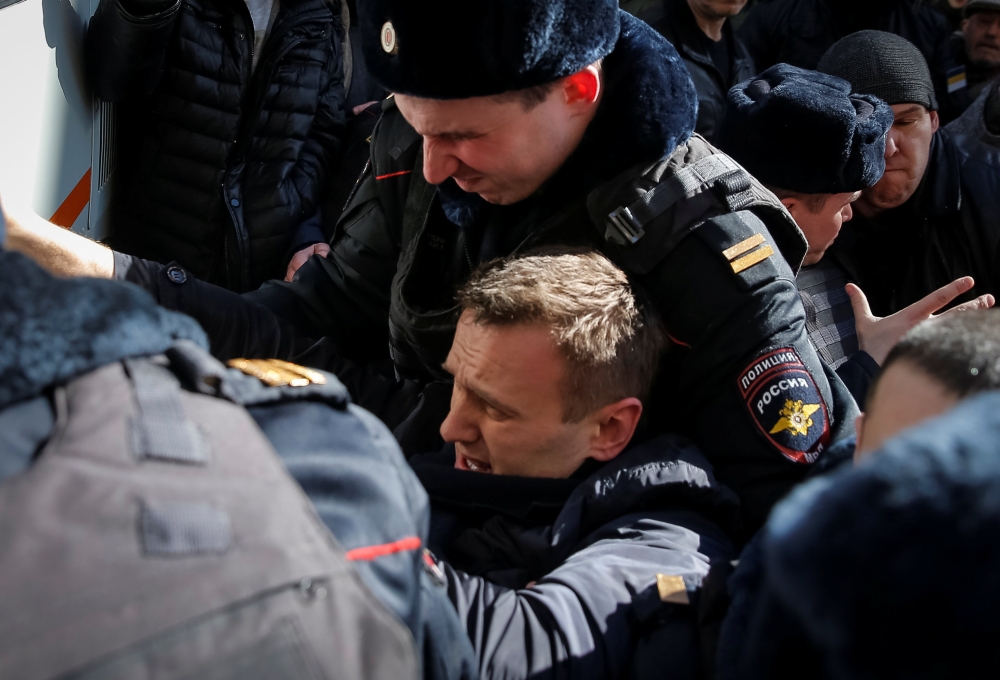 Russia's main opposition leader, Alexei Navalny, has been arrested at an anti-corruption protest he organised in the capital, Moscow. Russia's main opposition leader, Alexei Navalny, has been arrested at an anti-corruption protest he organised in the capital, Moscow.Thousands of people have joined rallies nationwide, calling for the resignation of Prime Minister Dmitry Medvedev over corruption allegations. Most of the marches have not been authorised by the authorities. Police have been deployed in large numbers in Moscow where dozens of other protesters have also been detained. TV pictures showed demonstrators chanting " Down with Putin!", " Russia without Putin!" and " Putin is a thief!".  Mr Navalny was detained as he arrived to join the rally in central Moscow. Protesters then tried to prevent a police van from taking him away. In a tweet after his detention, he urged fellow protesters to continue with the demonstration. " Guys, I'm fine. No need to fight to get me out. Walk along Tverskaya [Moscow main street]. Our topic of the day is the fight against corruption," he said (in Russian).  Anti-corruption campaigner and opposition figure Aleksey Navalny waves as he sits inside a police van after after being detained during a rally in Moscow, Russia, March 26, 2017. © Maxim Shemetov Anti-corruption campaigner and opposition figure Aleksey Navalny waves as he sits inside a police van after after being detained during a rally in Moscow, Russia, March 26, 2017. © Maxim ShemetovA rights group, OVD Info, said at least 130 people had been detained in Moscow and that police had used pepper spray to disperse the crowd, AFP news agency reports. Alexei Navalny called for the nationwide protests after he published reports claiming that Mr Medvedev controlled mansions, yachts and vineyards through a shadowy network of non-profit organisations. The prime minister has not commented on the claims. Demonstrations were also held in Saint-Petersburg, Vladivostok, Novosibirsk, Tomsk and several other cities, where arrests had also been reported. 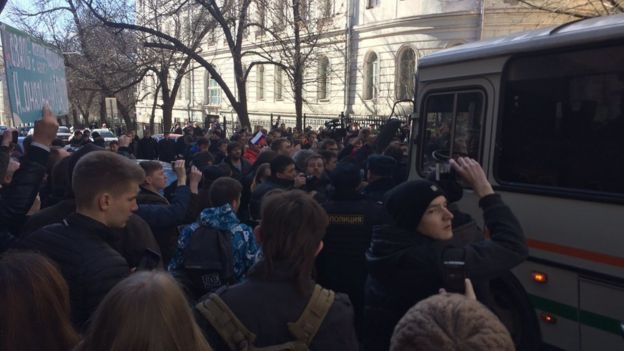 Protesters block the bus where Alexei Navalny was kept Protesters block the bus where Alexei Navalny was keptMr Navalny announced his intention to run for president against Vladimir Putin in 2018. But he is barred from doing so after being found guilty in a case he said was politicised. He said on his website that protests were planned in 99 cities, but that in 72 of them authorities did not give permission. 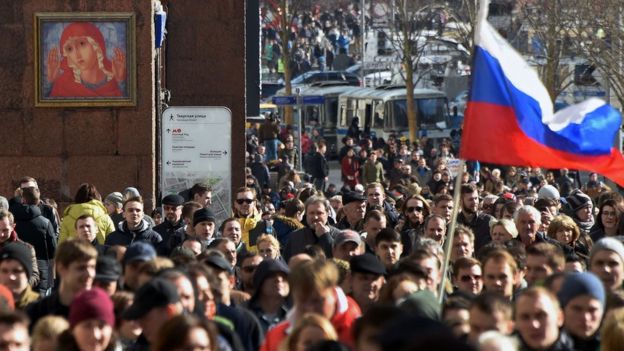 Between 3,000 and 4,000 protesters have gathered in Moscow, reports say Between 3,000 and 4,000 protesters have gathered in Moscow, reports say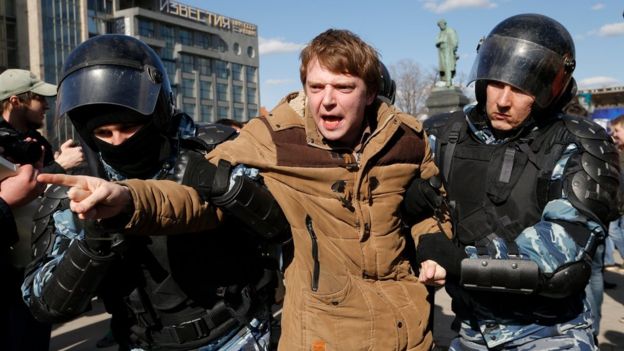 Dozens of protesters have been arrested in the capital Dozens of protesters have been arrested in the capitalSources: BBC, NOS and RT |
|
|
|
Post by Bonobo on Mar 26, 2017 18:00:32 GMT 1
Russia's main opposition leader, Alexei Navalny, has been arrested at an anti-corruption protest he organised in the capital, Moscow. It seems corruption of the elites has been doing well in Russia for centuries and nothing can can be done about it. Those several hundred decent Russians had better get used to it and not organise useless demonstrations. It is like demonstrating against the sun because it shines.     |
|
|
|
Post by pjotr on Mar 26, 2017 22:04:31 GMT 1
Dear Bo,  Czar Ivan the Terrible (1530 – 1584) Czar Ivan the Terrible (1530 – 1584)Do you see one straight line from Ivan the Terrible (1530 – 1584), the feudal boyars of the 16th–17th centuries, Peter the Great (Peter Alexeyevic; 1672 – 1725), Catherine the Great (1729 – 1796), Tsar Nicholas II (Nicholas the Bloody), to Vladimir Lenin, Joseph Stalin, Nikita Khrushchev, Leonid Ilyich Brezhnev, Boris Yeltsin, ' The Family' (Tatyana Yumasheva, Valentin Borisovich Yumashev, Oleg Deripaska, Alexander Korzhakov, Boris Berezovsky, Alexander Voloshin and Roman Abramovich), the Russian oligarchs (Vladimir Potanin, Vladimir Bogdanov, Rem Viakhirev, Vagit Alekperov, Alexander Smolensky, Victor Vekselberg, Mikhail Fridman and again Boris Berezovsky and Roman Abramovich), present President Vladimir Putin, the Russian Prime Minister Dmitry Medvedev and his First Deputy Prime Minister Igor Shuvalov; Minister of Interior Affairs Vladimir Kolokoltsev; Minister of Defence Sergey Shoygu; Minister of Foreign Affairs Sergey Lavrov; Minister of Justice (or injustice?) Alexander Konovalov; Minister of Finance (in a corrupt and nepotist country) Anton Siluanov.  Vladimir Lenin Vladimir Lenin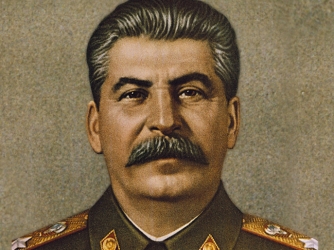 Joseph Stalin Joseph Stalin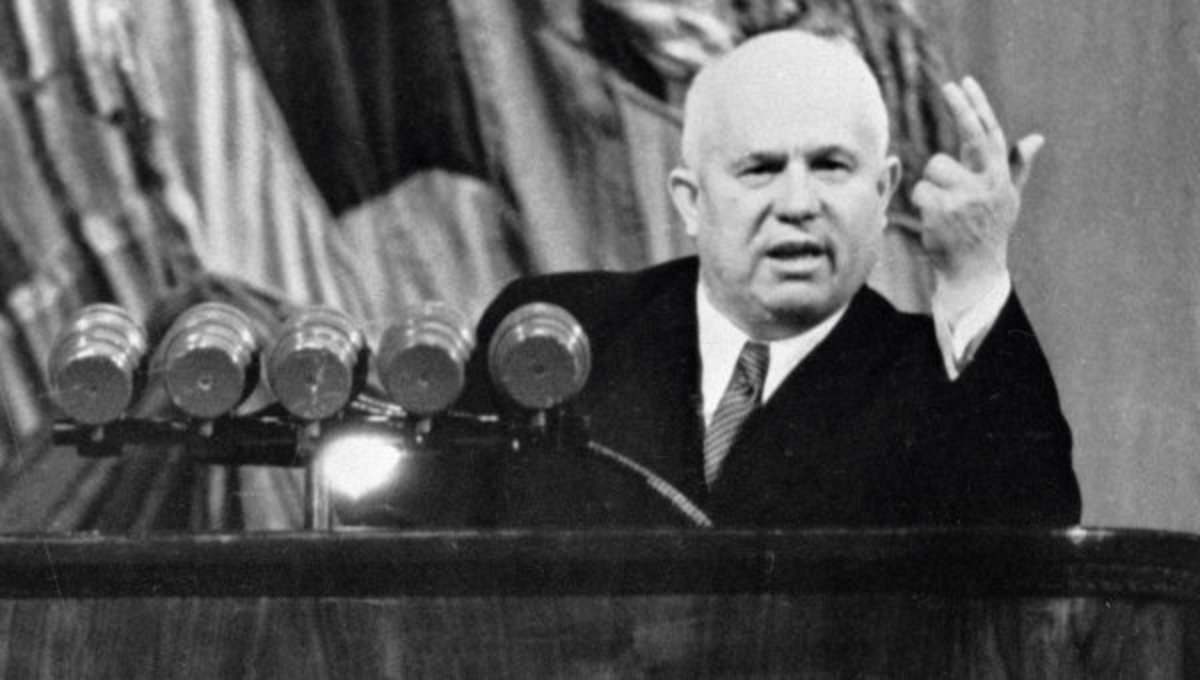 Nikita Khrushchev Nikita Khrushchev Leonid Ilyich Brezhnev Leonid Ilyich Brezhnev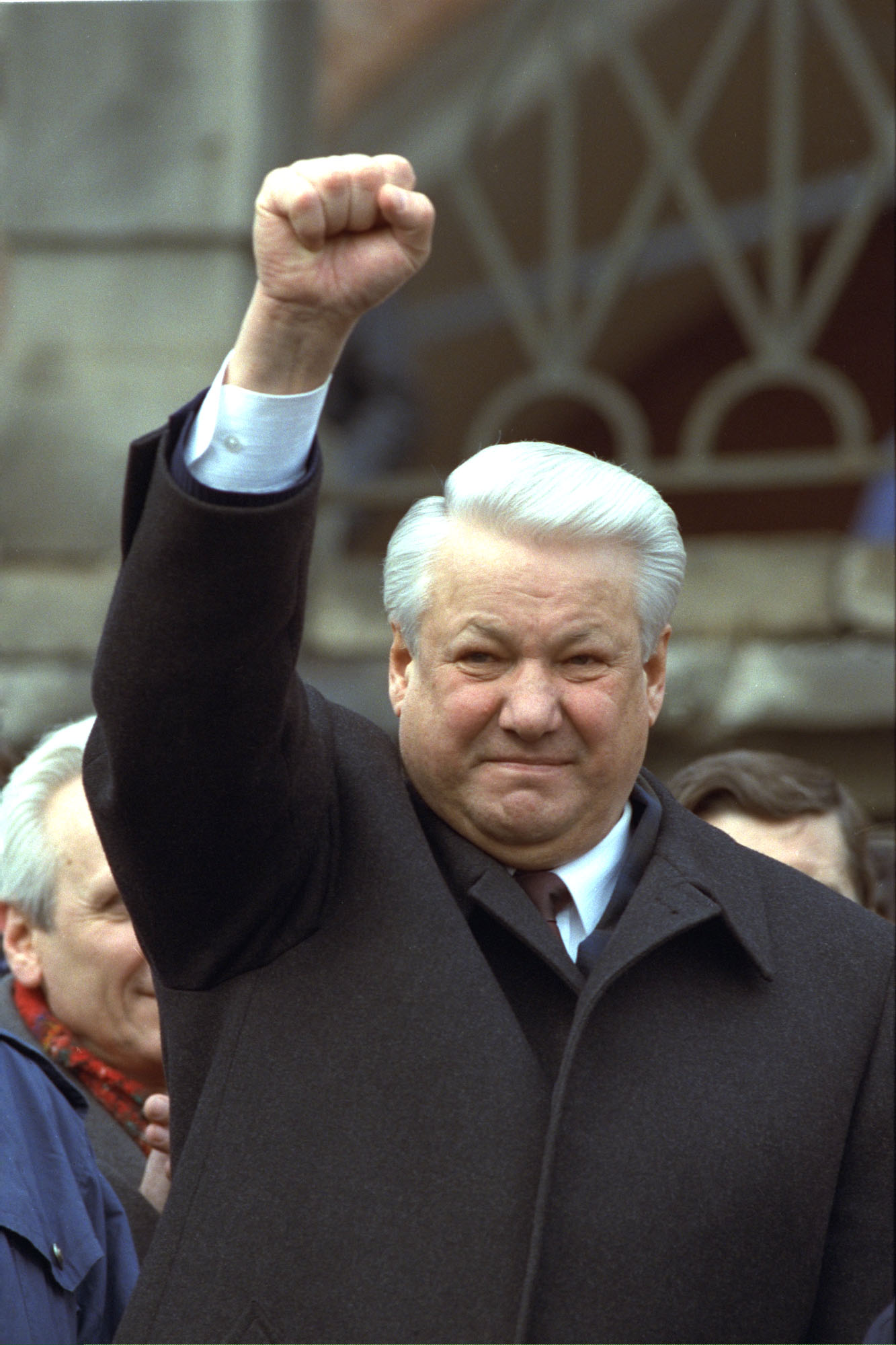 Boris Yeltsin Boris YeltsinIn present day Russia I see a perfect merger of a Czarist Russian-Orthodox Nationalist heritage merged with a Sovjet heritage and a few post-Sovjet elements. But the Sovjet and Czarist elements in present day Russia might be stronger than the few Post-Sovjet so called Russian Democratic elements. Russia is a democrature in my opinion, a merger of Democracy with authoritarianism or dictatorship. Putin combatted the corrupt and Nepotist Jeltsin oligarchs, but after them Putin and Medvedev loyalists and oligarchs gained power and simply replaced 'Jeltsins Family' and the Old oligarchs of the Nineties.  Vladimir Putin Vladimir Putin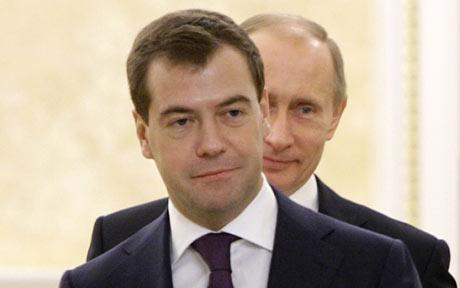 Dmitry Medvedev Dmitry MedvedevCheers, Pieter |
|
|
|
Post by pjotr on Mar 26, 2017 22:46:45 GMT 1
From the other side I hear sounds that Russia has an advanced agriculture today (with new innovative agricultural technology), a food industry which is linked to that. The Russian Federation has a lot of gas and petrol (oil), oil refineries, Platinum, and large energy and defense-related sectors.
Wiki
Russia's vast geography is an important determinant of its economic activity, with some sources estimating that Russia contains over 30 percent of the world's natural resources. The World Bank estimates the total value of Russia's natural resources at $75 trillion US dollars. Russia relies on energy revenues to drive most of its growth. Russia has an abundance of oil, natural gas and precious metals, which make up a major share of Russia's exports.
In 2015, the Russian economy was the sixth largest in the world by PPP and twelfth largest at market exchange rates. Between 2000 and 2012 Russia's energy exports fueled a rapid growth in living standards, with real disposable income rising by 160%.
The Russian economy risked going into recession from early 2014, mainly due to falling oil prices, the 2014 Russian military intervention in Ukraine, and the subsequent capital flight. While in 2014 GDP growth remained positive at 0.6%, in 2015 the Russian economy shrunk by 3.7% and was expected to shrink further in 2016. However, the World Bank and the IMF estimated that Russia's economy will begin to recover by 2017.
Encyclopedia Britannica
Russia has enormous energy resources and significant deposits of many different minerals. Most, if not all, of the raw materials required by modern industry are found within its borders. Its coal reserves are particularly extensive. The biggest fields lie in the remote Tunguska and Lena basins of East Siberia and the Far East, but these are largely untapped, and the bulk of output comes from more southerly fields along the Trans-Siberian Railroad. About three-fourths of Russia’s coal is produced in Siberia—some two-fifths from the Kuznetsk Basin alone and the remainder from the Kansk-Achinsk, Cheremkhovo, and South Yakut basins and numerous smaller sources. The production of hard (anthracite) coal in European Russia takes place mainly in the eastern Donets Basin and, in the Arctic, in the Pechora Basin around Vorkuta.
Russia is among the world’s leading producers of oil, extracting about one-fifth of the global total. It also is responsible for more than one-fourth of the world’s total natural gas output. The great bulk of oil and natural gas comes from the huge fields that underlie the northern part of the West Siberia region. Another significant source of reserves is the Volga-Ural zone, and the remainder is derived mainly from the Komi-Ukhta field (North region); the North Caucasus region, once the Soviet Union’s leading producer, is now of little importance. Extensive pipeline systems link production sites to all regions of the country, the neighbouring former Soviet republics, and, across the western frontier, numerous European countries.
Pieters comment about the Russian economy
Ofcourse Russia has a large manufacturing Industry, chemical industry since it produces cars, trucks, busses, trams, trains, passangers yets (For Aeroflot and other Russian Airliners), and probably computers, consumer products, and products for the export market (with the European Union, the USA, China, other Asian countries, Africa and the Middle east too). The Russian market is huge and if infrastructure with China per train is improved the growth of the import & export between the Russian Federation and Chi a will be huge. In the future Poland will benefit from that too. After the tensions will be gone, Polish farmers and entrepreneurs will export Polish agricultural and consumer products again. The Russian market is extremely important for the Polish farmers and food industry.
Back to Encyclopedia Britannica
Finance
Russia’s monetary unit is the ruble, which is now freely convertible, a radical departure from the practice of artificial exchange rates and rigid restrictions that existed during the Soviet era. The Russian Central Bank (RCB), which took over the functions of the Soviet-era Gosbank, is exclusively responsible for regulating the country’s monetary system. The bank’s primary function is to protect and stabilize the ruble, which it attempts to do through its control of foreign exchange. Under the constitution adopted in 1993, the RCB was given greater autonomy from the central government than the Gosbank had enjoyed, but its head is appointed by the president and subject to approval by the State Duma, the lower house of the Russian legislature. In 1995 the RCB was granted the authority to oversee all banking transactions, set exchange-rate policies, license banks, and service the country’s debt. To maintain its hard currency reserves, the RCB relies on the obligation of all exporters to convert half their hard-currency earnings into rubles. In the mid-1990s the RCB established a system of supervision and inspection of the country’s commercial banks.
The state-owned Russian commercial banks, such as Vneshtorgbank and Sberbank, shadow the RCB both in the pursuit of stability and in operations philosophy. The banking sector is frequently accused of cronyism, benefiting only a select few, particularly former communist apparatchiks. Before the banking crisis in the late 1990s, private commercial banks mushroomed, but most of them acted as outsourcing financial agents for enterprises inherited from the Soviet era. By the beginning of the 21st century, two major clusters of banks had survived. One cluster, which included the National Reserve Bank, Gazprombank, Promstroybank, and International Moscow Bank, served the oil and gas industry. The second cluster, consisting of banks servicing the government of Moscow, included the Bank of Moscow, Mosbusinessbank, Guta Bank, Most Bank, Unikombank, International Financial Corporation, Sobinbank, MDM Bank, Toribank, Promradtekhbank, and dozens of smaller banks.
Foreign trade
Foreign trade is tremendously important to the Russian economy. The country has generally enjoyed a healthy trade surplus since the dissolution of the Soviet Union. Primary exports include oil, metals, machinery, chemicals, and forestry products. Principal imports include machinery and foods. Among Russia’s leading trade partners are Germany, the United States, Belarus, Ukraine, and China.
|
|























